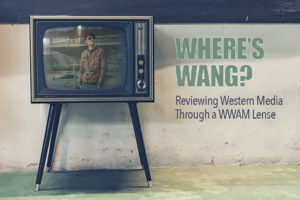With China’s movie posters, what you see, might not actually be what you get anymore. As Sixth Tone reported earlier this week, a new strategy for movie promotion in China now seems to be to randomly superimpose young Chinese heartthrobs (note: the examples seen so far only include young males) on movie posters. “Kingsman 2” picked Wang Junkai, a famous boy band member, while “Blade Runner 2049” chose Wang Kai, an actor in one of China’s more popular TV installments “Ode to Joy,” to front their movies without actually appearing in them. “Spider-Man: Homecoming” opted for rapper PG One, winner of “Rap of China,” as the misleading face for their posters. In order to create at least some kind of connection between the latter two participants and the respective movies, in which they did not star, they were at least involved in recording songs for the local soundtrack.
Evidently, this is in an attempt by promoters to create more of a rapport with their Chinese audiences, who will often find themselves sorely underrepresented in Hollywood movies. So far, it has actually been working according to Sixth Tone, as Wang was listed in a survey asking for the reason people purchased tickets to go see “Kingsman 2.” However, the question is for how long. Once people get to the cinema to find the reason for their visit is nowhere in sight, one would imagine utter disappointment. After all, if one walked into a movie expecting Liam Neeson or Heath Ledger, one could be forgiven for a lack of enthusiasm at suddenly encountering Wang Junkai. It probably won’t take long for people to be able to figure out they need to check the “not-so-fine” print on movie posters from now on. In many cases the poster does hold a very obvious reference to the depicted celebrity being a “promotion ambassador” or something similarly dodgy.
However, from a WWAM and pro-Asian representation perspective, this is not just a really confusing, slightly disingenuous and definitely lazy attempt at making movies more relevant to the impressively-sized Chinese market. (China’s total box office reached nearly 45 billion RMB ($6.7/£5.15/€5.83 billion, almost quadrupling in size over the past five years.) What makes it worse is that Hollywood movies and their promoters are effectively saying, “We will use your Asian face to help us access this valuable market, but we won’t actually go so far as to let you have a part in our movies”.
On the other hand, I strongly disagree with the second tendency observed in Hollywood over recent years to just cast famous Chinese actors in some minor role, and have just a bit of the story set in Shanghai or Hong Kong as a way of playing to the Chinese box office masses. Many of these Chinese stars come aboard with very dubious acting talent – some would argue The Martian’s Chen Shu was a bit of a waste of filmreel – and the stark gap in acting abilities makes these Asian actors an easy target of ridicule.

In this way, the photobombing fiasco is just another part in the story of Hollywood movie producers and promoters making very average choices that don’t add to the quality of the film. The irony being that while Hollywood previously shunned Asian features, they now seemingly can’t get enough of them.
What I would ask for, though, as always on Where’s Wang, is that these companies find ways of more naturally including Asian or Asian heritage actors or filming locations. There are many, many people out there with these “box-office success features” who have much more acting talent than many of the so-called A-list actors floating about China nowadays (ah, the Chinese movie industry – that’s a whole other can of worms). It’s not enough to slap a Chinese celebrity sticker on a movie poster and mislead audiences. Neither is it enough to cast that person just because they’re considered a Chinese celebrity. In a way, it’s the Hollywood machine pretending to change their practices by featuring Asians, but really it’s just about Orientalism and exploitation of Asian faces without granting them genuine representation. Step up your Asian game, Hollywood, and stop embarrassing yourself with shiny packaging and no substance.
Where’s Wang is WWAM BAM!’s bi-weekly column
“For the most part, what we see of Asian male sexuality is the assertion of a stronger Western virility at the expense of Asian masculinity. In short, the imagery takes Asian men lightly, as less-serious competitors for women, and less-competent fighters.” Sheridan Prasso, The Asian Mystique

The “Where’s Wang” tag allows us at WWAM BAM! to review how present this bias is within sitcoms and other tv shows having come out of the Hollywood machine (and other media) over the past few years, and review any media through an AMWF lens.
- How 3 WWAMs celebrate(d) Christmas in Asia - December 20, 2022
- How 4 WWAMs Celebrate Thanksgiving in Asia - November 23, 2022
- Where’s Wang? Turning Red - November 15, 2022

